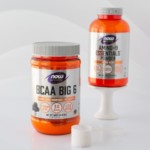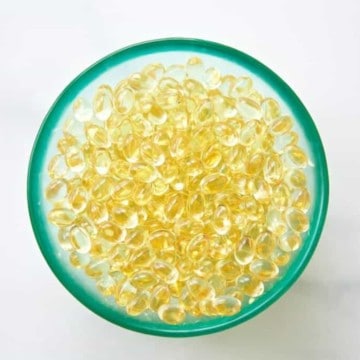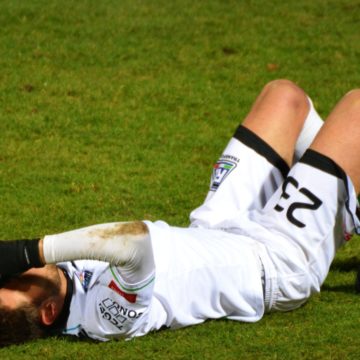
Many teen athletes are interested in taking dietary supplements to help them be their best. In this article, you’ll learn about the benefits of creatine for teenagers. We’ll also discuss if creatine is safe for teens and the best creatine brands for teens.
As a former high school athlete who played soccer and ran cross-country, I had a natural tendency towards being very competitive. This meant I went to ALL the pre-season practices, conditioning/lifting workouts, and one-on-one training opportunities. If something could help me improve, I was there.
This is a great mentality for improving physical performance. It wasn’t until later in life I discovered training could only take me so far without a solid nutrition plan for muscle growth and recovery. Many young athletes also find themselves in this situation. They are willing to put the work in on the field or in the gym. But they may be seriously lacking a purposeful nutrition strategy to support that training.
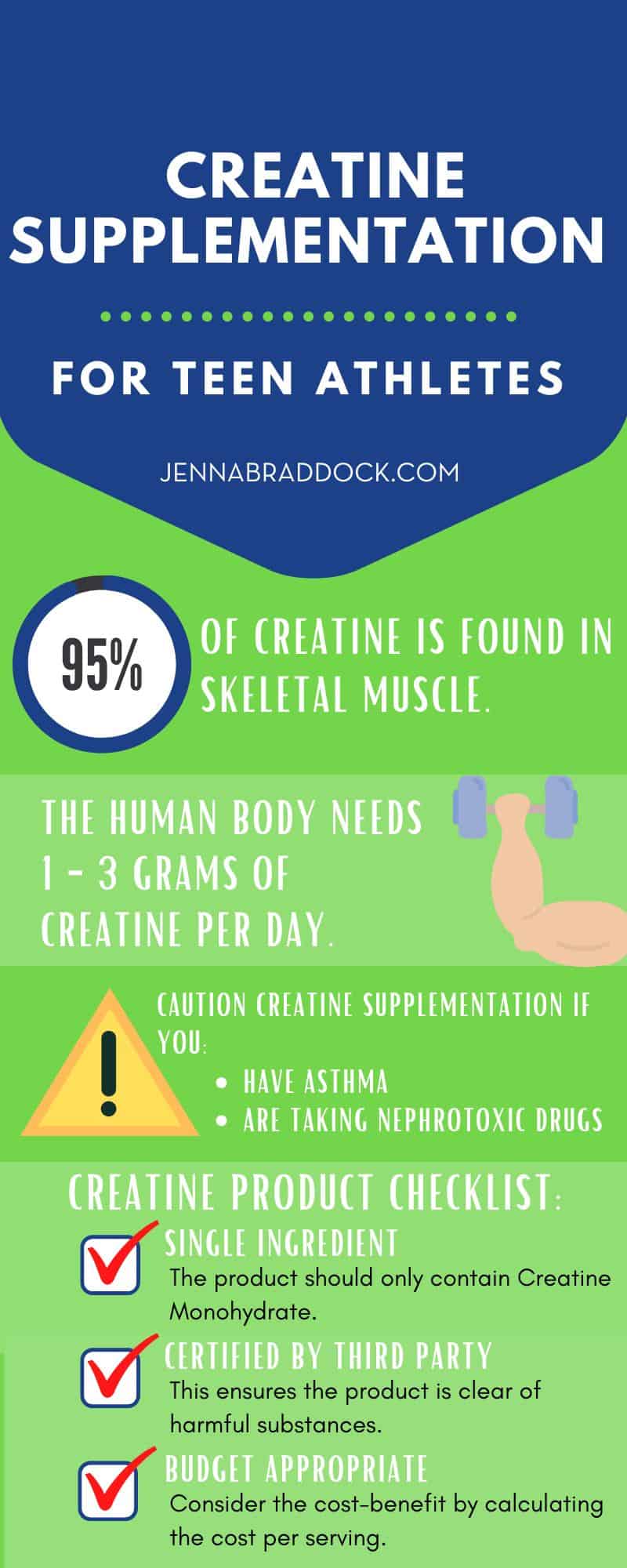
We can find plenty of information on the internet about sports nutrition, but it’s not geared for teen athletes. This is particularly true for sports supplements and creatine may be the one teen athletes wonder the most about. Perhaps you’ve even experienced your athlete come home from practice and say, “I want to take creatine, all my friends are taking it”. I’m sure almost immediately, a pang of doubt and uncertainty hits you. Maybe this is followed by a long list of questions about creatine and uncertainty regarding where to find answers.
You’ve come to the right place. Off-Season Athlete exists to help teen athletes and their parents know what is safe and effective for improving athletic performance. Current research has revealed that anywhere from 15 – 40% of high school athletes use some form of creatine supplementation. Does this mean they should be?1 Let’s pull back the curtain on creatine. Here are the facts from current research on creatine and its use in high school level athletes.
What is Creatine?
Creatine is a type of protein we naturally find in the human body. Creatine is stored in the muscles where your body uses it to generate energy during high-intensity exercise and heavy lifting. The energy from creatine stored in the muscles is called phosphocreatine.
What Does Creatine Do?
Creatine plays a large role in many bodily processes, but especially in high-intensity exercise. When you supplement creatine it increases your stores of creatine, or phosphocreatine within the muscle. In other words, the energy stores within your muscles are increased. They are made more available for the body to use during exercise.1
Foods that Contain Creatine
Your body can produce one-third of the creatine it needs through the liver and kidneys. We can obtain the other two-thirds through a well-balanced diet. Unlike other nutrients creatine does not have a recommended daily allowance (RDA). However, studies have revealed that the body needs about 1 – 3 g of creatine a day to maintain normal stores.2
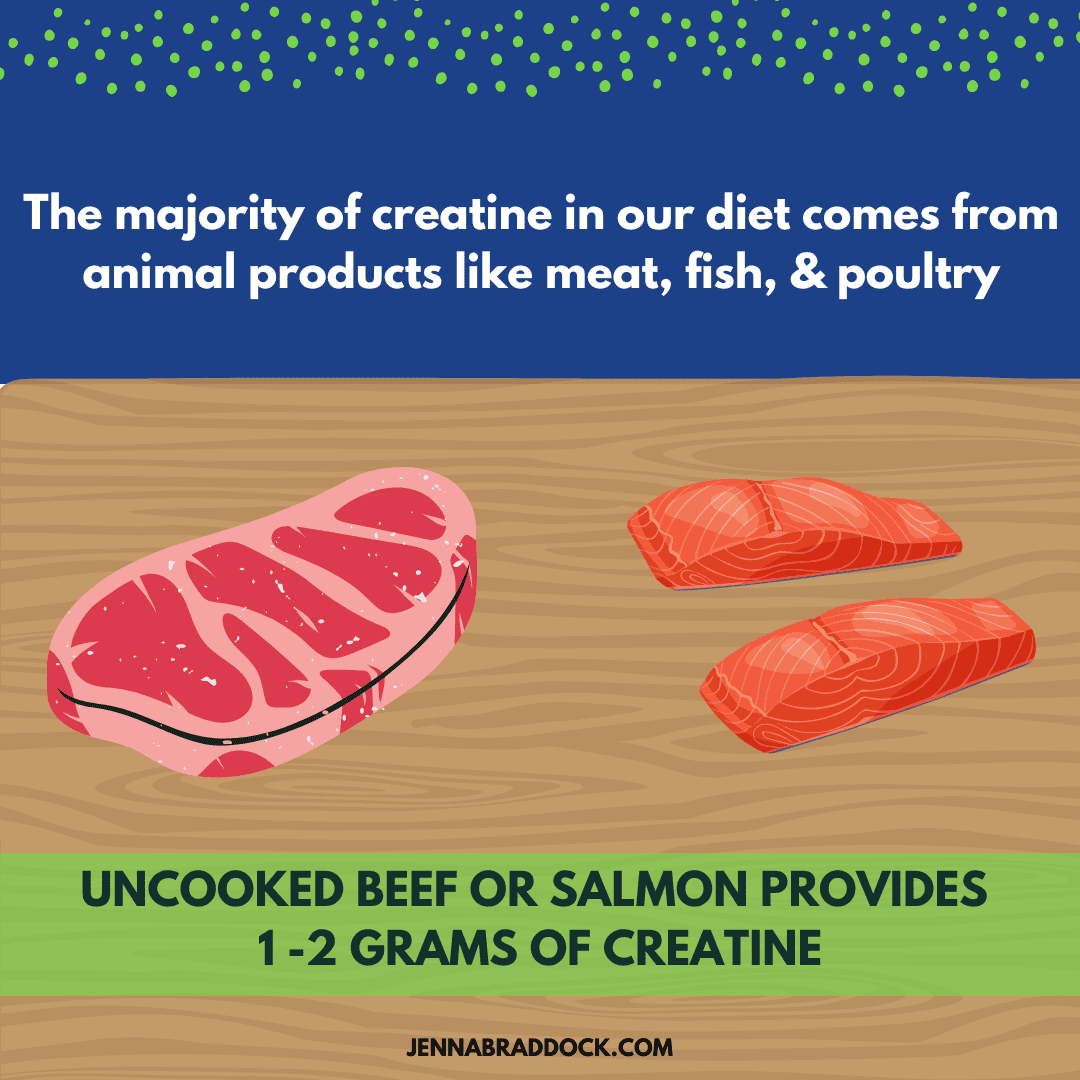
I always suggest trying to meet nutritional needs through your diet first before turning to supplements. A balanced diet provides nutrients such as fiber and antioxidants that supplements tend to lack. We primarily fine creatine in red meat and seafood. For example, a pound of uncooked beef or salmon provides about 1 – 2 g of creatine.2
What are the Benefits of Creatine for Teenagers?
The benefits of creatine for adult athletes has been studied extensively. These studies suggest that creatine supplementation can improve exercise performance and training adaptations. Furthermore, the research indicates that creatine supplementation may enhance post-exercise recovery, injury prevention, and concussion and/or spinal cord neuroprotection.1
Is Creatine Supplementation Safe for Teen Athletes?
The lack of literature surrounding the safety of creatine use in teenagers has led to many misconceptions. For example, one may reference that a con of creatine is the warning signs on product labels cautioning individuals younger than 18 years of age to not supplement creatine. However we should recognize that the warnings on labels are not evidence-based. They become more of a legal precaution related to the lack of knowledge on creatine and its side effects on younger populations.
Fortunately, new research is emerging suggesting that creatine is not only safe for teens, but very beneficial as well. There have been recent articles suggesting that creatine supplement use is safe for teenage populations.
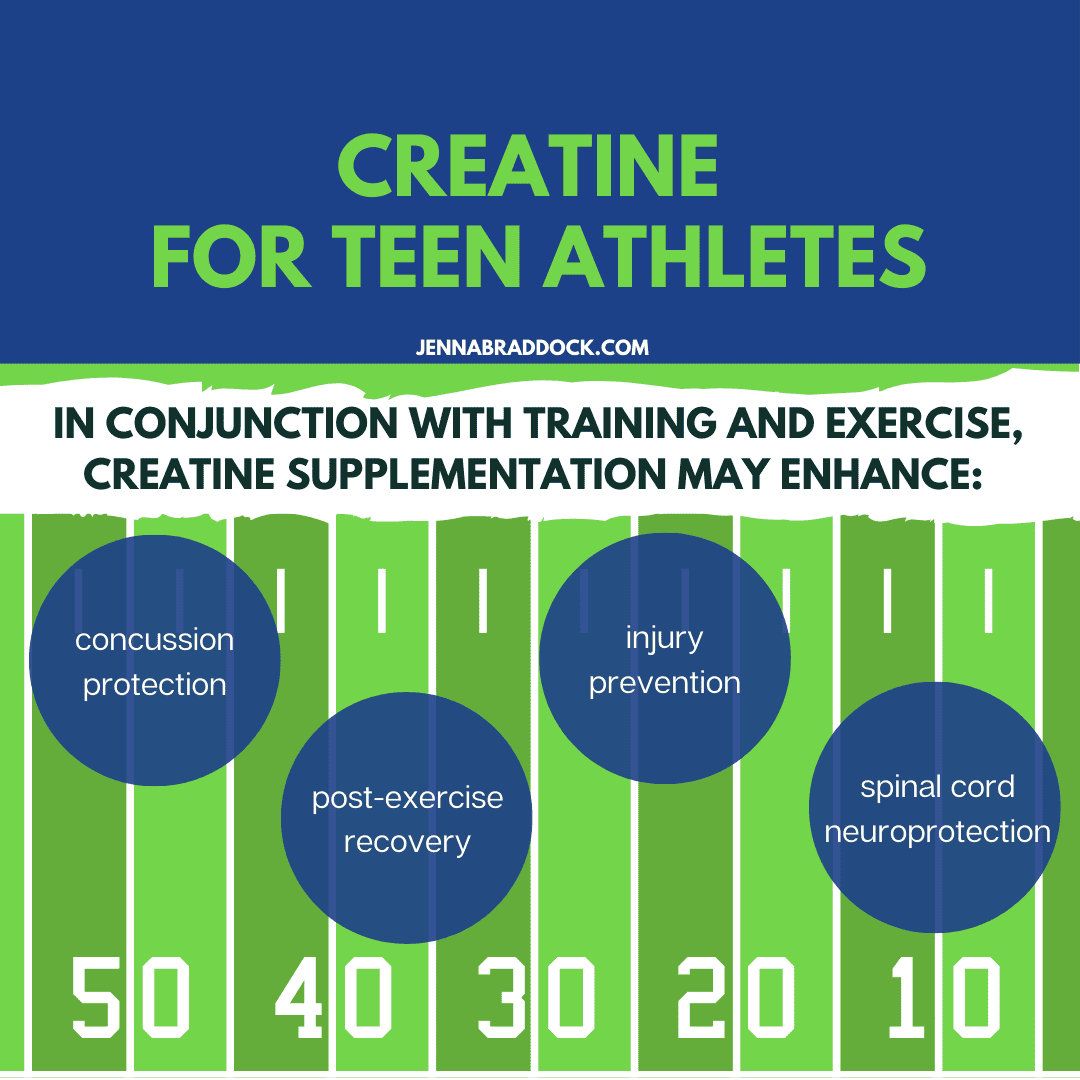
One study showed that supplemented creatine could potentially increase protection of the brain before a concussion. Creatine aids and alleviates symptoms associated with concussion recovery. Studies further suggest that teen athletes can benefit from creatine supplementation as it improves recovery, cognition, and fatigue.3
Remember more is not better when using supplements. Creatine could potentially have harmful effects if taken incorrectly or in conjunction with kidney damaging medications (nephrotoxic drugs). Types of these include aspirin, ibuprofen and naproxen (Aleve).4 Young people who take these medications regularly should talk to their medical professional before beginning a creatine routine to reduce the risk of adverse effects.
Furthermore, a recent study has shown that individuals with asthma may want to be especially careful if they choose to supplement with creatine, suggesting that unfavorable changes in airway inflammation were seen in adolescents who supplemented creatine.5
When to Take Creatine Supplements
If you scour the internet trying to find out the best time to supplement creatine you’ll find various different outlets giving you loads of different advice. The fact of the matter is that the evidence from research is conflicting. In my professional opinion, I suggest starting in the off-season if you’re beginning the use of creatine for the first time.
Similar to a new prescription medication, you never know how your body is going to adapt and react to the introduction of a new nutritional supplement. In the chance that your body has a poor reaction to the supplement, you really do not want it to affect training or performance at any point during the season.
In spite of that, it is also important to know that when starting to supplement creatine, particularly in the loading phase (a term I’ll delve into later on), creatine users may notice weight gain and/or bloating. This is common and is typically short term. However, it’s important to note that it may impair weight-related performance in sports such as cross-country, track, and wrestling.6
How Much Creatine Do You Take?
First and foremost, it is important to speak with a sports medicine doctor or sports dietitian. They will help discover if supplemented creatine would be appropriate and benefit your teen. These professionals can guide you in determining how much creatine your teen may need based on their diet and level of physical activity.
To work with Jenna Braddock, a certified specialist in sports dietetics, on creating the right supplement plan for your teen athlete, visit her private practice page here.
We supplement creatine using a loading dose and maintenance dose. The term “loading dose” can sound a bit intimidating. This is especially true when talking about sports nutrition supplements in athletes, let alone your teenage athletes.
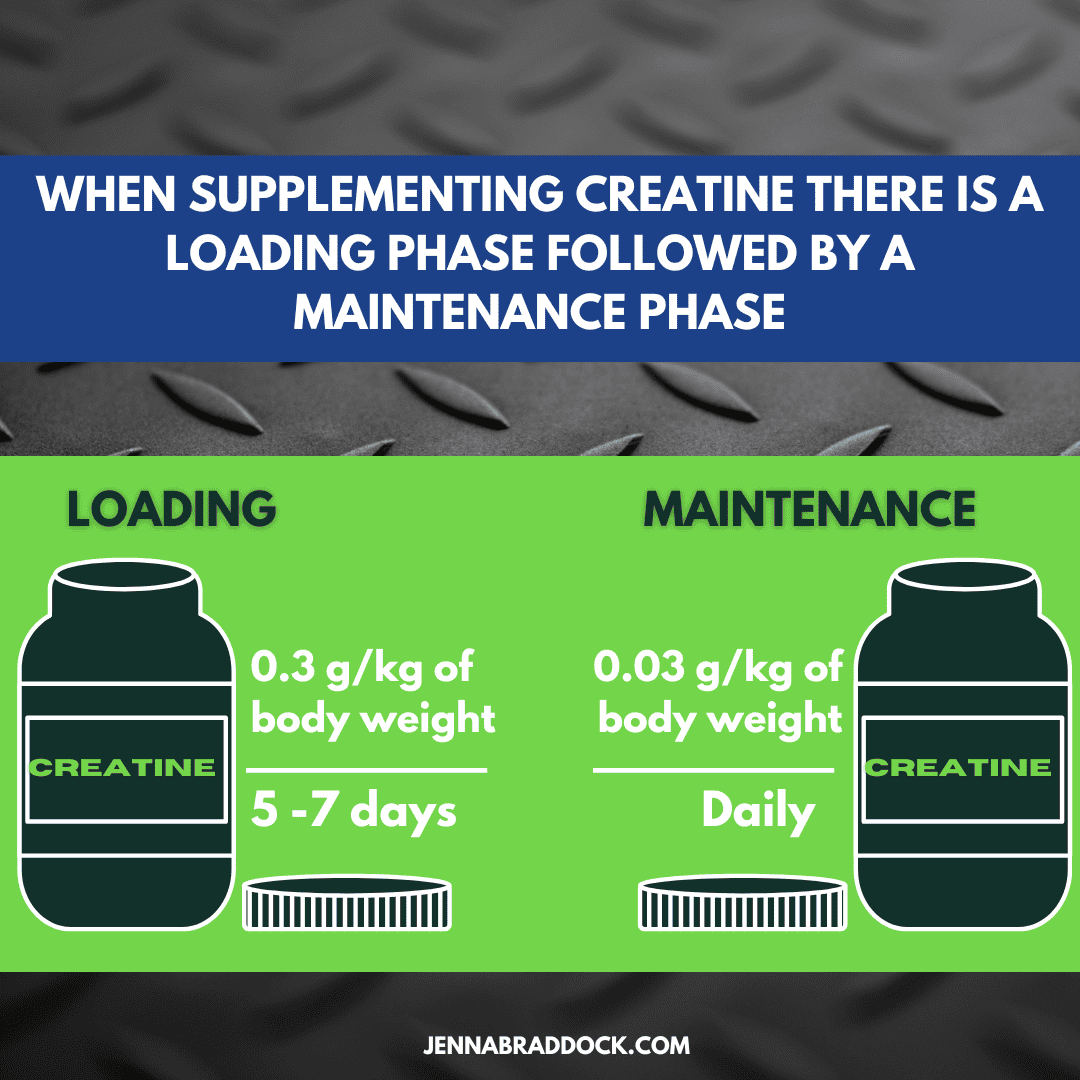
The loading period is beneficial because it saturates the muscle to its upper limit of capacity with creatine to be used for muscle energy during training. We commonly use a loading dose of 0.3 grams per kilogram of body weight per day for 5 -7 days when starting creatine supplementation. Following the loading phase, the daily dose to maintain elevated creatine stores is 0.03 grams of creatine per kilogram of bodyweight.1
What Kind of Creatine Supplement Should You Buy for Teen Athletes?
The supplement market is constantly evolving. This makes it difficult to determine whether a product is of high quality, safe, and tested. We find creatine supplements in various stores at varying prices with a wide array of other ingredients.
It is very important to consider brand, amount of creatine, and hidden harmful ingredients when thinking about choosing the best creatine supplements for your teen athlete. A checklist to use when identifying the right product is:
- Single Ingredient – The product only contains Creatine Monohydrate and nothing else.
- Certified by Third Party – This ensures the product is pure and does not contain trace amounts of any other ingredients, including harmful or banned substances. Look for NSF Certified for Sport, Informed Choice, or USP certified.
- Budget Appropriate – Some supplements can be pricey. It’s important to weigh the cost-benefit of using your money on the supplement or just more healthy food in general. Consider figuring the cost per serving of the supplement by dividing the total cost by the number of servings. If it is low and affordable for you, great! If it’s getting too close to the amount you would spend on a serving of food for a snack or meal, you may want to reconsider it.
Brands of Creatine
Here are a couple of the best creatine brands for teens that meet the criteria appropriate for adolescent athletes. Please note, we are not saying your teen athlete should take these creatine supplements. It’s important to work directly with a Sports Dietitian to determine what is the best product. They will also help you determine dosing for each unique situation.
These are affiliate links that will take you to FullScript.com where you can create a secure account to order trusted products.
Conclusion
If your athlete seems like a good candidate for creatine, please work with your sports medicine doctor and sports dietitian. Do this at least initially to create the right plan and monitor progress.
Hopefully this information has helped you feel more confident in engaging with your athlete on the topic of the benefits of creatine as you determine if it’s a good step for them.
Written By

Written By: Jenna Braddock, MSH, RD, CSSD, LD/N, ACSM-CPT & Jessie Melendez, University of North Florida Dietetic Intern
I moved to Jacksonville, Florida in the Fall of 2019 as a graduate student and dietetic intern at the University of North Florida (UNF). Prior to UNF, I completed my bachelors degree in Human Nutrition, Foods, and Exercise with a concentration in dietetics at Virginia Tech. Since starting my journey in the nutrition and dietetics field I have learned how to critically review research to find evidence-based answers. Through my internship I am able to apply my knowledge in nutrition to educate people of various backgrounds on healthy food choices that fit their lifestyle. When I’m not keeping busy with my classes and internship you can find me lounging at the beach or cruising on a bike ride.
References
- Jagim AR, Stecker RA, Harty PS, Erickson JL, Kerksick CM. Safety of Creatine Supplementation in Active Adolescents and Youth: A Brief Review. Front Nutr. 2018;5:115. doi:10.3389/fnut.2018.00115.
- Kreider RB, Kalman DS, Antonio J, et al. International Society of Sports Nutrition position stand: safety and efficacy of creatine supplementation in exercise, sport, and medicine. J Int Soc Sports Nutr. 2017;14:18. doi:10.1186/s12970-017-0173-z
- Ainsley Dean PJ, Arikan G, Opitz B, Sterr A. Potential for use of creatine supplementation following mild traumatic brain injury. Concussion. 2017;2(2):CNC34. doi:10.2217/cnc-2016-0016.
- Taner B, Aysim O, Abdulkadir U. The effects of the recommended dose of creatine monohydrate on kidney function. NDT Plus. 2011;4(1):23-24. doi:10.1093/ndtplus/sfq177
- Simpson AJ, Horne S, Sharp P, et al. Effect of creatine supplementation on the airways of youth elite soccer players. Med Sci Sports Exerc. 2019;51(8): 1582 – 1590. doi: 10.1249/MSS.0000000000001979.
- Naderi A, de Oliveira EP, Ziegenfuss TN, Willems MT. Timing, Optimal Dose and Intake Duration of Dietary Supplements with Evidence-Based Use in Sports Nutrition. J Exerc Nutrition Biochem. 2016;20(4):1-12. doi:10.20463/jenb.2016.0031








